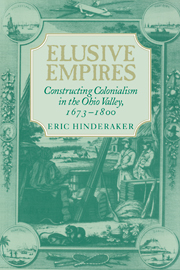Preface
Published online by Cambridge University Press: 16 February 2010
Summary
WHAT are the ends of empire? There is no simple answer. This book examines the efforts of France, Britain, and the United States to extend imperial dominion over the Ohio Valley, and contends that three distinct models of empire competed for acceptance in the region. The first two – empires of commerce and empires of land – accompanied French and British colonization. Empires of commerce sought to trade for economic resources with native populations; empires of land sought to export European populations across the Atlantic and thus exploit American resources more invasively. In practice the line between these competing views of empire was often blurred; they are entirely distinct only as analytical constructs. Separating them, however, allows us to develop a clearer appreciation for their discrete and often conflicting characteristics. In the American Revolution a third type of empire was born in the Ohio Valley: an empire of liberty, which departed fundamentally from earlier European conceptions of empire-building.
It is important to emphasize at the outset that I use the concept of empire somewhat differently than many other writers have. I treat empires more like processes than structures, and more as creations of the people immediately engaged in colonization than of policy directives originating in London, Paris, Philadelphia, or Washington.
- Type
- Chapter
- Information
- Elusive EmpiresConstructing Colonialism in the Ohio Valley, 1673–1800, pp. xi - xviPublisher: Cambridge University PressPrint publication year: 1997



